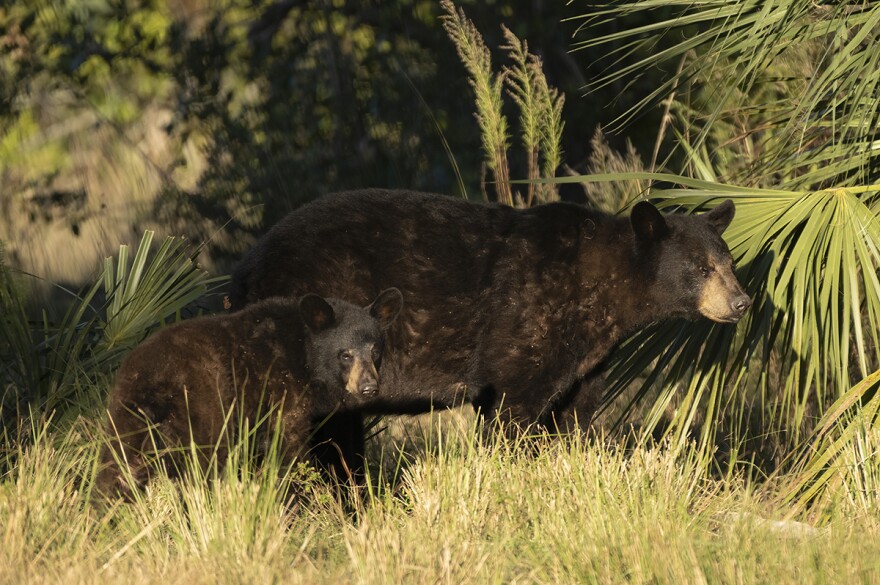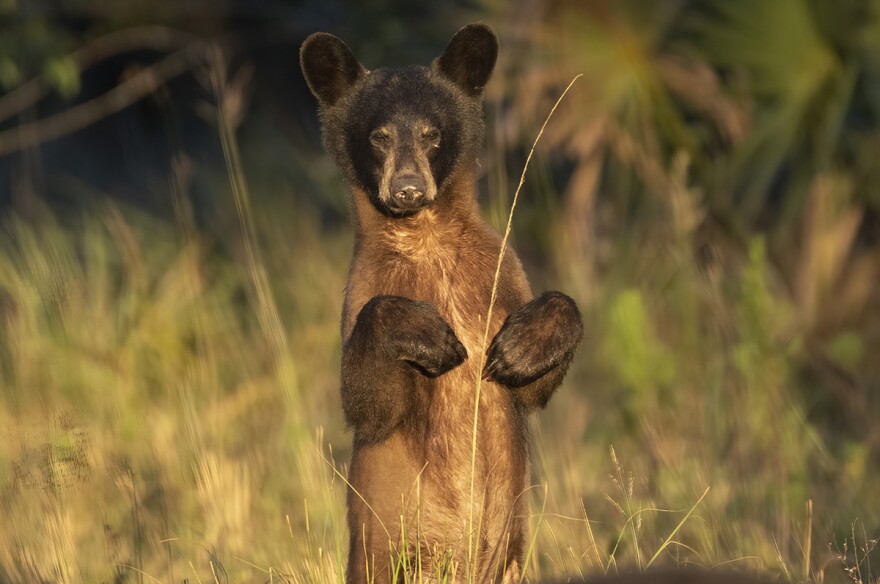Florida’s black bear hunt is scheduled to go forward next month despite its unpopularity and a lack of recent population studies to know if the mammal’s numbers are in decline.
The Florida Fish and Wildlife Conservation Commission (FWC) unanimously approved the hunt earlier this fall despite opposition, including a protest at the state Capitol building on Monday.
A survey by the FWC showed 75% of 13,000 self-selected respondents were against the hunt. Though commissioners stressed the hunt is backed by science, the organization’s website shows the latest bear-population surveys won’t be updated until 2028.
Bear Warriors United, a nonprofit dedicated to preserving Florida’s wildlife, filed a lawsuit to try to pause the upcoming hunt, set for Dec. 6 to Dec. 28. The hearing is scheduled in Leon County on Nov. 24. Another lawsuit pending against FWC aims to stop the hunt for future years.
WUFT obtained a September report by bear management scientist Brian Schieck showing a two-thirds decrease in bear density in the Osceola population. FWC reduced the number of bears allowed to be hunted in the area by 15 in response without publicly stating why.
Schieck did not respond to a request for comment. FWC declined an interview and directed WUFT to its website.
Katrina Shadix, founder of Bear Warriors United, is on the FWC’s bear technical assistance group (TAG). She sits in on twice-annual meetings with the TAG team regarding bear populations and health.

“If we have slow growth in one of the biggest bear populations, this is indicating that bears are in trouble,” Shadix said. “We’re using their own science to prove our point that this bear hunt is wrong, and it should never have been approved.”
The International Order of T. Roosevelt is a hunting and conservation foundation.It filed an amicus brief, or a statement of interest to the court, on the proposed pause. The Roosevelt order cites Amendment 2, which Florida voters passed by more than 67% in last year’s election, establishing a constitutional right to hunt and fish in the state.
“‘Florida voters spoke loud and clear: Hunting is our right and the best way to manage wildlife,’” Roosevelt order CEO Luke Hilgemann said in a statement. “‘This bear hunt honors our traditions and protects ecosystems. Hunting isn't just heritage; it's humane science.’”
The bear hunt will take place in four of the state’s seven bear management units: East Panhandle, North, Central and South. The hunting grounds overlap in areas with the black-bear inspired Florida Wildlife Corridor created in 2021 to connect public and private lands to conserve Florida’s wild places and animals. The FWC will allow hunting in the Ocala to Osceola Wildlife Corridor, where Shadix said TAG has seen population declines and slow growth.
Kate MacFall, Florida’s director of Humane World for Animals, said keeping the wildlife corridor safe for native species is crucial for biodiversity.
“Floridians really care about protecting bears,” she said. “And when you protect bear habitat, you protect habitat for so many other amazing species.”
Florida’s largest native land mammal, black bears have come back from justa few hundred in the 1970s to about 4,000 today.
The Florida black bear is one of 16 subspecies of the American black bear. Today,they roam only 49% of their original habitat. Black bears can detect food from almost a mile away, which is how they’ve been able to survive in urban areas as deforestation and development continue to shrink their habitat.
Theirshiny black fur appears slightly brown in the summer due to fur loss, and about 30% of them have a white patch on their chest called a blaze. The adults are about the same size as the average human, ranging from 4 to 6 feet tall. The vast majority of their food is plant based.
The Florida black bear has killed one person on record, and that was in May of this year. The NRA Hunters’ Leadership Forum says it’s a tragedy opponents of the hunt are skirting over while bear advocates say attacks on humans are exceedingly rare.

“Black bears are terrified of people,” MacFall said. “They're very shy. Where there's a problem is when humans run them over with their cars, take away their habitat and knock down all the trees.”
Roadways are considered the biggest threat to Florida black bears. Since 2012, vehicles have killed at least 200 bears annually.
Ron Magill, communications director for Zoo Miami, has photographed and worked with wildlife for decades. He said he’s never had an incident where a bear threatened him.
“They’re trying to scare people into thinking we have to kill these bears because otherwise they’re going to show up and eat your children,” Magill said. “Which is just ridiculous. Not to mention the fact that the previous bear hunt was an absolute disaster.”
Florida’s last bear hunt, in 2015, was canceled after just two days because hunters killed 304 bears, just 16 short of the quota for the entire hunt. Those killed included lactating mothers and cubs. The FWC’s report on the hunt attributed the overharvest to a miscalculation of the bear population.
Magill said another reason he doesn’t support the hunt is because he considers it trophy hunting. Pointing out his own leather shoes and the fact he eats meat, he said he understands the circle of life but says this species is different.
“I don’t support killing an animal simply to put its head on your wall or its rug on your floor,” Magill said. “That’s just the wrong reason to kill an animal.”
Some are also concerned with the lack of safeguards to prevent inhumane killings of black bears. Adam Sugalski, an animal advocate and the executive director of One Protest, said allowing bows and arrows, baiting stations and hunting dogs are his main concerns.
Though dogs will not be allowed for this year’s hunt, hunters can start training them for use in 2027, unless future hunts are blocked by the courts. The FWC’s bear website says use of dogs will help hunters avoid killing lactating females and cubs because the canines will run the bears up trees, where hunters can better see their gender and size.

The use of dogs also returns to an old Florida hunting tradition. The Cross Creek writer Marjorie Kinnan Rawlings famously wrote about hunting a bear with dogs in her novel “The Yearling”; she went on a real bear hunt to get the details.
With regard to the use of bows and arrows, Sugalski said it’s more painful for the bear unless the hunter wielding them is an expert archer.
Feeding stations will lure bears to the hunting zone, similarly to how unsecured trash cans in the suburbs attract them. This new measure replaces check stations, a precaution used in 2015 to count the bears.
Sugalski was at a check station in 2015. He and his team monitored bear kills to ensure a proper count. When it neared 300, he said, they called the FWC to stop the hunt.
Like in 2015, FWC held a lottery for bear-hunt applications, allowing 172 permits this year, down from 187 before the reduction in the Osceola area. Florida residents pay $100 for a permit while out-of-state residents pay $300. Hunters can receive only one permit, and they are non-transferable.
Sugalski and Shadix were both part of an effort to apply for permits to reduce the number given to bear hunters. FWC received more than 163,000 applications, giving each applicant about a one-in-a-thousand chance of being accepted. It’s unknown how many of those came from activists and non-hunters who don’t intend to hunt a bear.

